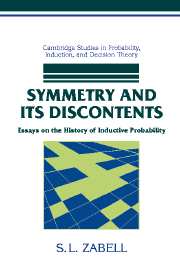10 - Predicting the Unpredictable
Published online by Cambridge University Press: 05 June 2012
Summary
Abstract. A major difficulty for currently existing theories of inductive inference involves the question of what to do when novel, unknown, or previously unsuspected phenomena occur. In this paper one particular instance of this difficulty is considered, the so-called sampling of species problem.
The classical probabilistic theories of inductive inference due to Laplace, Johnson, de Finetti, and Carnap adopt a model of simple enumerative induction in which there are a prespecified number of types or species which may be observed. But, realistically, this is often not the case. In 1838 the English mathematician Augustus De Morgan proposed a modification of the Laplacian model to accommodate situations where the possible types or species to be observed are not assumed to be known in advance; but he did not advance a justification for his solution.
In this paper a general philosophical approach to such problems is suggested, drawing on work of the English mathematician J. F. C. Kingman. It then emerges that the solution advanced by De Morgan has a very deep, if not totally unexpected, justification. The key idea is that although “exchangeable” random sequences are the right objects to consider when all possible outcome-types are known in advance, exchangeable random partitions are the right objects to consider when they are not. The result turns out to be very satisfying. The classical theory has several basic elements: a representation theorem for the general exchangeable sequence (the de Finetti representation theorem), a distinguished class of sequences (those employing Dirichlet priors), and a corresponding rule of succession (the continuum of inductive methods).
- Type
- Chapter
- Information
- Symmetry and its DiscontentsEssays on the History of Inductive Probability, pp. 217 - 242Publisher: Cambridge University PressPrint publication year: 2005



